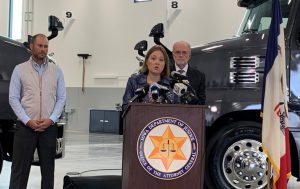Iowa joins suits trying to block rules designed to phase out diesel-powered semis
May 15th, 2024 by Ric Hanson
(Radio Iowa) – Iowa is among a group of states suing the State of California and the Biden Administration over rules that critics say will force the trucking industry to convert to electric semis before the power grid can support the transition. Iowa Attorney General Brenna Bird says it’s the worst nightmare for the supply chain. “Electric trucks are a lot more expensive than the diesel trucks and they barely exist, mostly as prototypes,” Bird says. “Biden and California’s radical ‘green dream’ is unrealistic and it’s out of touch, a fantasy.”
Two dozen states, including Iowa, are going to court to try to block E-P-A rules about emissions from semi tractors’ tailpipes. A separate legal action involving Iowa and 17 other states is challenging California’s plan to require zero carbon emissions from semis operating in California that come from trucking companies with over 50 trucks. That rule would go into effect in 2036.
Iowa Motor Truck Association chairman Scott Szymanek is president of Stutsman, Incorporated, a trucking company based in the small town of Hills, near Iowa City. He says ithe trucking industry cannot convert to electric semis as quickly as the regulations require. “Battery electric vehicles are a viable option for some trucking operations, such as urban delivery and even school buses, but you cannot move the entire U.S. economy a battery vehicle alone,” he says. “It is simply unrealistic.”

Iowa Attorney General Brenna Bird speaks during news conference at Housby Co. in Ankeny. She was joined by Dale Decker of Decker Truck Line, on left, and Iowa Motor Truck Association chair Scott Szymanek on right. (RI photo)
Szymanek says renewable diesel fuel has a lower carbon footprint over its life cycle when compared to battery-operated trucks. Dale Decker, the C-E-O of Decker Truck Line, says his company has been testing electric trucks at their facility in Fort Dodge, but Decker says sending battery powered semis out on the highways is unrealistic. “It’s just not possible with the cost and charge times, the distance, weather factors. Cold, hot changes the distance on where the truck can go, the capability of that truck,” Decker says. “Sure, we’d all like to get there, but pushing this down our throat like this is just not a way to go.”
The U-S Supreme Court recently ruled California can enforce animal welfare rules related to pork that’s produced elsewhere, but sold in California. Bird says she’s disappointed in that ruling, but the attorneys general will argue, as they did in the pork-related case, that California’s rule is a violation of the U-S Constitution’s interstate commerce clause. “California does not have the power to tell another state what to do, particularly when it comes to trucking,” Bird says. “What California is doing is extreme.”
Bird says there are other legal precedents directly related to cases involving the trucking industry that support the effort to block California’s ‘clean fleet’ trucking rules. California officials have said while only six percent of the vehicles on California roads are trucks, those trucks account for a quarter of the state’s transportation-generated greenhouse gas emissions.





